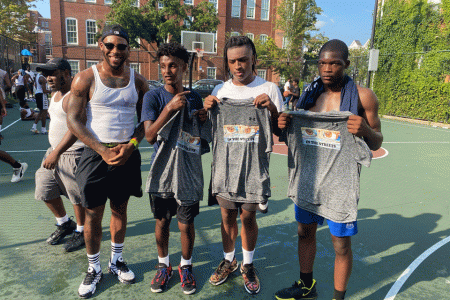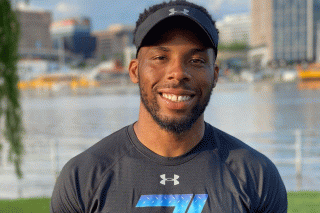Fellonte Misher ’23MSW was playing professional football in Poland when COVID-19 cut the season short. Back home in Columbia Heights, Washington D.C. he saw people struggling with the effects of gun violence and gentrification, who also lacked the resources to support their mental health.
“It took me going overseas a few times to see things differently,” says Misher. “In D.C., the discussions around mental health and therapy are limited.” Like others, at first he wasn’t inclined to discuss his emotions. “At home, everyone fits into the same mold. Overseas, I got a better grasp of who I am. I was able to process and connect to traumatizing events in my life and accept what happened, and be better equipped to move forward and be a happier person.”
Reflecting on his experience, Misher recognizes the need for support and counseling, especially among a community lacking access to counselors where discussions of mental health are taboo. “A lot of folks aren’t ready to hear about that stuff — their trauma is still at the forefront.” Still, he knew he wanted to help. “When I thought of furthering my education, I thought of different ways I could reach the community. I researched social work, therapy, counseling.”
That led him to Simmons’ School of Social Work, where he is getting his master’s degree online. “Simmons was willing to give me a chance, despite a low GPA in my undergraduate program,” he says, “I’ve grown so much since undergrad, and Simmons allowed me to show that by writing an essay and getting recommendations to show that growth.”
During his college years, Misher was focused on football. “I trained my entire life to go to the NFL. I didn’t, so what do I do now?” He recalls teachers advising him to have a backup plan in case his football career didn’t pan out. “They would suggest I become a teacher or a lawyer — but the teachers and lawyers I saw didn't resemble who I am as a Black man. The Black men that I saw become successful were athletes — that was what my view was confined to. It’s hard to envision anything else without representation.”

Similarly, it’s difficult to talk about mental health when there are no counselors who look like you. That’s an issue Misher hopes to remedy. “After I get my degree, I want to start my own clinical practice in my community. It’s easy to share with someone who has experienced similar things to you, but hard when the person you’re talking to isn’t clued in. We need more mental health providers in our community, and I want to empower folks to serve each other.”
That is also the mission of In the Streets, the non-profit Misher co-founded in the midst of the pandemic. His co-founder, Sangeeta Prasad, received funding to start a support group for young Black men in the community who may not have access to counseling services.
“In the Streets also offers unconventional therapy, like art therapy, group therapy, guided meditations, and yoga,” says Misher, who also emphasizes the importance of physical health to your overall well being. “I meet up regularly with a group of young guys to work out and play basketball, and we have conversations. I help them figure out a game plan if they’ve lost their job or can’t make the rent. It’s not real case work, but it’s still providing support and guidance.”
In the Streets is working with the government in D.C. to host a summer internship that would pay participants in the program, which would include physical and mental health education. The program will have separate groups for older (ages 19-24) and younger kids (ages 14-18). “That age range is strategic,” he says. “Our goal is to interrupt generational trauma. We want the next generation of parents to be mindful of things that they’re passing on to their kids.”
Our goal is to interrupt generational trauma. We want the next generation of parents to be mindful of things that they’re passing on to their kids.
Well-recognized as a leader in his community, Misher knows everyone, and everyone knows him. He is careful not to violate that trust, and is strategic in how he approaches people for a chat. “There is a window in the day when you can talk to folks,” he says. “If I see you at noon and the people who influence you aren’t there, then I can talk to you about something that is a little taboo for you and you may be more accepting.” Misher has also planned basketball tournaments and Community Days. “Food is super motivating — I do a lot of lunches and dinners. When everyone is having a good time, they are more open to what you have to say.”
He knows that representation, and the lack of it, makes an impact in any setting. “I’ve learned a lot in my three semesters at Simmons,” he says. “I’m the only Black person in the class. When we’re talking about oppression, I have a unique view of this subject and I’m super open to sharing those thoughts. I used to be really timid about speaking up, but there is a power in it. We’re all here to seek answers and feel validated about what we are going through.”
Misher wants to help young people visualize ways to become a successful person. “I want them to see success as attainable. That’s why I have that group of guys I meet for workouts, and I’m still being myself, talking how I want to talk. Hopefully those guys will expand that to the younger group coming up.”

